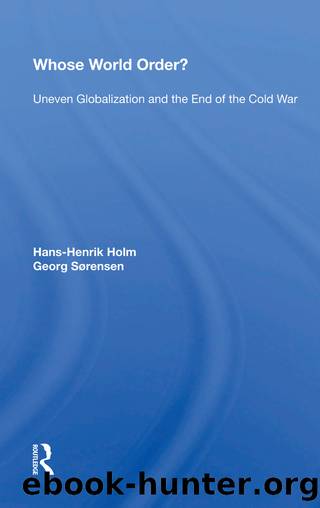Whose World Order?: Uneven Globalization and the End of the Cold War by Hans-henrik Holm & Georg Sorensen

Author:Hans-henrik Holm & Georg Sorensen [Holm, Hans-henrik & Sorensen, Georg]
Language: eng
Format: epub
Tags: International Relations, Globalization, Political Science, General
ISBN: 9780813321868
Google: YT1nAAAAMAAJ
Goodreads: 4480355
Publisher: Westview Press
Published: 1995-03-02T00:00:00+00:00
The World Economy
The end of geography seems to affect Pacific Asia more than other regions. The fact is that the Pacific Asian region is less closed and institutionalized than other regions. After all, it is in Western Europe that we find the architects of first the Rome and then the Maastricht Treaty, leading toward deeper integration of the 12 member countries. It is in North America that market liberalization in the unilateral and bilateral contexts among the three giants, that is, Canada, the United States, and Mexico, is being vigorously carried out. It is only in Pacific Asia that regional integration has not been institutionalized by formal agreements. The Asian Pacific Economic Cooperation (APEC) conference represents the most institutionalized form of economic coordination and cooperation within an area encompassing Australia, New Zealand, ASEAN, Vietnam, China-Taiwan-Hong Kong, Northeast Asia including Russia, Canada, the United States, and Mexico. But its degree of institutionalization is much lower than the European Community and the North American Free Trade Agreement (NAFTA). Of all the international institutions in Pacific Asia, the Asian Development Bank (ADB) may be one of the most powerful. Its budget is very likely to surpass that of the World Bank if Japan's initiative to increase its own and other major countries' contributions is successful. But the Asian Development Bank is not an institution designed specifically for regional integration. Both the APEC and the ADB are institutions primarily designed for facilitating economic development and cooperation in the region. Pacific Asia places utmost emphasis on market mechanisms to facilitate regional transactions.
Three major factors explain why Pacific Asia has been basically reluctant to go ahead with regional integrative institutionalization. First, it is not likely to benefit from regionalist self-enclosure. It benefits from an open trading system. It desperately needs open access to the big markets of North America and Western Europe. Given the relatively poor endowment of food and energy resources in relation to the large demographic size and rapid speed of industrialization, it needs to manufacture and export to the rest of the world. This picture applies not only to such obvious countries as Japan and South Korea but also to such countries as China and Indonesia. Even if the other two economic regions resort to regionalist and protectionist solutions, Pacific Asia cannot afford to resort to any institutionalized form of regionalism and protectionism. That is widely perceived in the region to be suicidal.
Second, Pacific Asia is a world of corporate networks that often involve governments. In many cases these networks effectively prevent foreign or extraregional actors from entering into markets. Pacific Asia is not alone in having corporate networks and government-corporate alliances. Continental Western Europe is another region known for these associations. Names and forms may differ, but the basic fact is that networking matters both in Pacific Asia and in Western Europe. You may call it keiretsu, guanxi, cartel, corporatism, or whatever. Especially noteworthy here are Japanese government-business relations beyond borders and Chinese business networks across borders. Japanese government-business relations, nurtured since
Download
This site does not store any files on its server. We only index and link to content provided by other sites. Please contact the content providers to delete copyright contents if any and email us, we'll remove relevant links or contents immediately.
Spell It Out by David Crystal(35852)
Life for Me Ain't Been No Crystal Stair by Susan Sheehan(35539)
Cecilia; Or, Memoirs of an Heiress — Volume 1 by Fanny Burney(32068)
Cecilia; Or, Memoirs of an Heiress — Volume 3 by Fanny Burney(31463)
Cecilia; Or, Memoirs of an Heiress — Volume 2 by Fanny Burney(31413)
The Great Music City by Andrea Baker(30794)
Professional Troublemaker by Luvvie Ajayi Jones(29425)
We're Going to Need More Wine by Gabrielle Union(18641)
Twilight of the Idols With the Antichrist and Ecce Homo by Friedrich Nietzsche(18304)
The Secret History by Donna Tartt(18190)
All the Missing Girls by Megan Miranda(14769)
Cat's cradle by Kurt Vonnegut(14768)
Pimp by Iceberg Slim(13789)
Bombshells: Glamour Girls of a Lifetime by Sullivan Steve(13692)
Fifty Shades Freed by E L James(12923)
Talking to Strangers by Malcolm Gladwell(12887)
Norse Mythology by Gaiman Neil(12847)
The Social Justice Warrior Handbook by Lisa De Pasquale(11957)
Underground: A Human History of the Worlds Beneath Our Feet by Will Hunt(11843)
